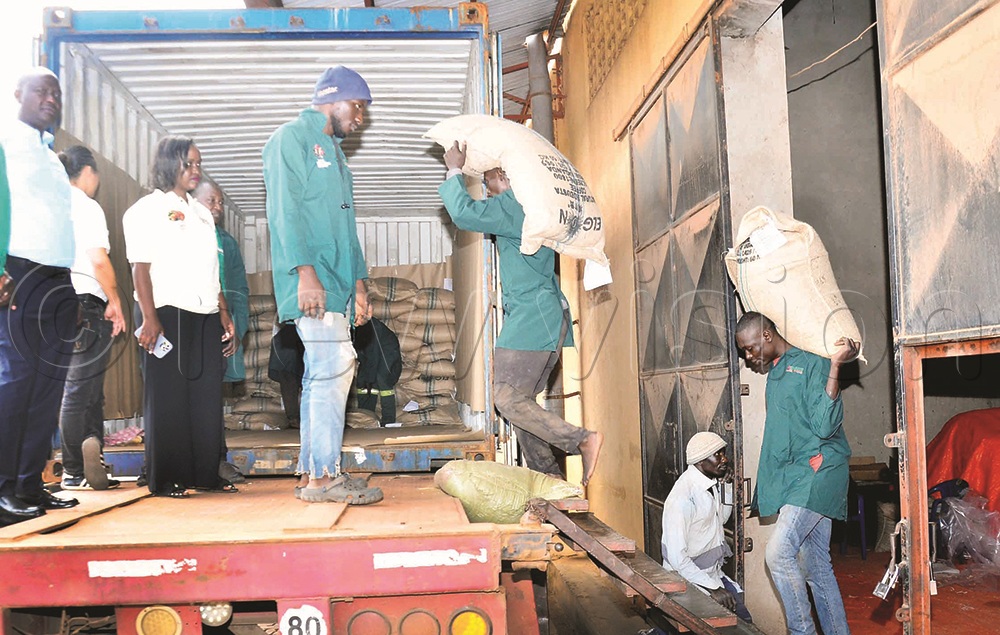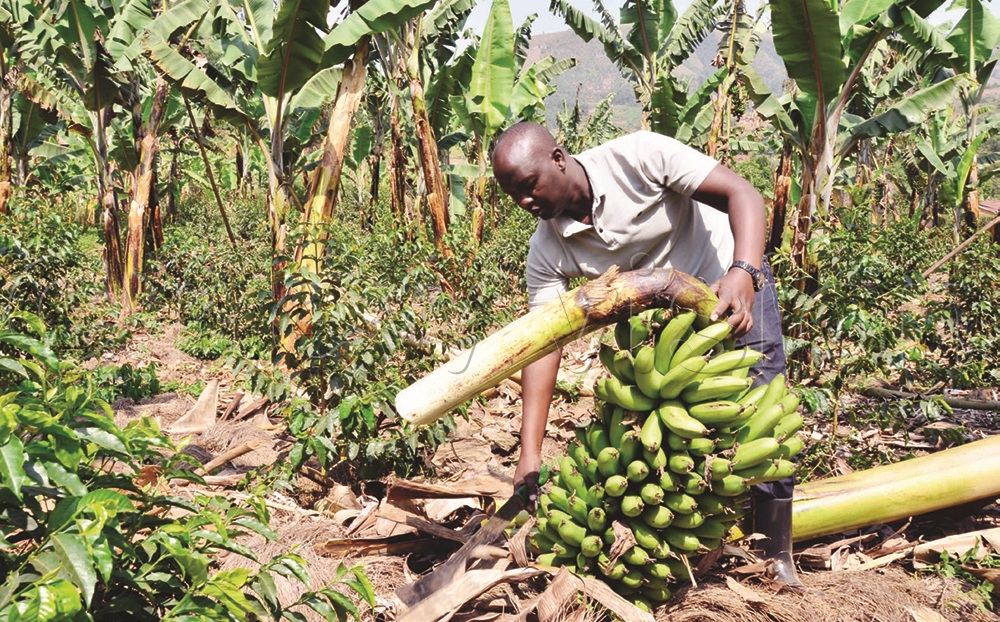Ruhakana’s leap of faith in coffee export trade pays off
“Coffee has good returns, but you must be very careful with money. We avoid unnecessary expenses and always reinvest to grow.”
Ruhakana in his coffee farm in Rukiga district. (Photos by Umar Nsubuga)
________________
For the tenth year running, Vision Group, together with the Embassy of the Netherlands, KLM Airlines, dfcu Bank and Koudijs Animal Nutrition, is running the Best Farmers Competition.
The 2025 competition will run from April to November, with the awards in December. Every week, Vision Group platforms will publish profi les of the farmers. Winners will walk away with sh150m and a fully paid-for trip to the Netherlands.
When Winston Ruhakana first shipped a small consignment of Ugandan coffee in 2018, it was not part of a business plan, it was a leap of faith. What began as an experiment sparked by a trip to Turkey has since evolved into a thriving export business — Bowi Logistics Limited.
Working alongside his wife, Rachael, the couple has also established a 15-acre coffee plantation in Nyakeina village, Rukiga district.
Building Bowi logistics
The idea that sparked Ruhakana’s journey into coffee came in 2017 during a trip to Istanbul, Turkey.
“I went with my wife, and we toured several coffee shops. I noticed their coffee lacked the rich flavour I was used to back home,” he recalls.

Workers loading coffee on the truck for exportation to Kenya, China and Dubai, among other places.
Upon inquiry, Ruhakana learnt that most of their beans were sourced from South America.
He suggested supplying African coffee and to his surprise, the Turkish baristas agreed. Back in Uganda, Ruhakana shipped samples of local beans to Turkey. The feedback was positive.
“They told me Ugandan coffee had an excellent aroma and taste,” he says.
By 2018, Ruhakanas had officially registered Bowi Logistics Limited. Their capital included savings and a bank loan.
Navigating contracts, certifications and strict buyer expectations was daunting, but when the consignment was approved, they knew they were on the right path. Within months, what started with small orders, that is, a tonne or two, scaled to full 20ft containers.
In 2019, they expanded their export destinations to include Kenya, China and Dubai. Establishing the export business was not a smooth sail.
“Logistics, quality control and financing were major hurdles. But once clients tasted Ugandan coffee, they wanted more. The challenge shifted from finding markets to ensuring a steady supply of the right quality.”
To meet the demand, the Ruhakanas source beans from Uganda’s key coffee-growing regions: Kisoro, Kabale, Rukiga, Mbale, Kapchorwa and Bulambuli districts.
As his export business grew, Ruhakana noticed that coffee from high-altitude areas like Kigezi sub-region, which includes Kisoro and Kabale districts, has a unique profile that international buyers love.
“Whenever we exported coffee from Kigezi, it scored very highly in international labs. But very few people were growing it on a large scale, which bothered me. That gap between quality and quantity pushed me to act,” he says.
Ruhakana started with attempting to persuade family members to grow coffee on family land.
He also dreamt of managing over 20 acres, but acquiring contiguous farmland was difficult.
Ruhakana did not give up the search until he acquired a contiguous 15-acre block in Nyakeina village in 2020.
In 2022, he laid the foundation for what is now one of the district’s most promising coffee ventures, despite early scepticism from neighbours.
Ruhakana also credits local government support for a water system.
“We only contributed sh4m out of sh35m, with the rest coming from local authorities.”
To boost the supply of this high-quality coffee for export, Ruhakana also interested residents to grow the crop, but says, it was an uphill task.
“People were used to fast-maturing crops like Irish potatoes. Coffee, which takes three to five years before yielding a meaningful harvest, seemed too slow. In the early years, you’re paying workers, buying inputs, and managing the farm, while not earning anything,” he says.
For many, this waiting period is discouraging. But Ruhakana believed in the long-term rewards. This October, his plantation is three years old and ready for its first significant harvest.
The couple grows Arabica coffee intercropped with matooke on the 15-acre farm. While coffee matures, matooke provides food security and short-term income. Ruhakana harvests and sells matooke every three weeks.
He harvests 30-45 bunches, selling each at sh15,000 to sh17,000 in Muhanga town. Some of the bunches are fed to farm workers.

For Ruhakana, matooke provides food security and short-term income.
Financing and patience
Commercial coffee farming is not for the faint-hearted. The costs have been substantial. Land acquisition, seedlings, irrigation, extension services and labour all require continuous funding.
“Farming is capital-intensive. You keep injecting money, but it takes years to see profit. Many people give up, but patience is the secret,” Ruhakana says.
To reduce risk and ensure quality, he brought in professional support, including extension workers and a farm manager. Ruhakana also involved his family in the day-to-day operations. His wife, Rachael, plays an active role in Bowi Logistics, while their children are gradually being introduced to the farm.
“We want them to understand where our resources come from,” he says.
On the financial side, Rachael emphasises the importance of discipline. She oversees budgeting, ensuring every shilling is accounted for, whether reinvested in the farm, used for marketing or allocated to company operations.
“Coffee has good returns, but you must be very careful with money. We avoid unnecessary expenses and always reinvest to grow,” she says.
Rachael says regular farm visits are essential. Together, she and her husband supervise workers, inspect the gardens and ensure best agricultural practices are followed.
“Coffee is delicate. If you don’t supervise, you lose both quality and quantity,” Rachael says.
These visits also offer opportunities to engage with other farmers in their network and share knowledge. To maintain security and biosecurity, the farm is fenced, guarded and access is controlled with sanitation protocols.
Ruhakana admits that one of his early mistakes was underestimating the cost of farm management.
He quickly learnt the value of planning, training and meticulous record-keeping.
Today, his team includes six permanent employees and several casual workers, whom he retains through fair pay and trust. The other challenges are natural, including dry spells, erratic rainfall and pests like the coffee twig borer, which he mitigates through irrigation and spraying.
As an exporter, Ruhakana also faces global challenges that include:
- Price volatility that can erode profits
- Logistical issues like transport delays and port congestion
- Fraudulent players in the coffee trade who damage Uganda’s reputation
A community model
Ruhakana’s farm is a regional learning hub. Farmers visit to study spacing, pruning, soil management and pest control. Researchers document growth patterns, while district officials assess its potential for replication. The project has created jobs for youth as managers and labourers.
“This is more than my farm; it’s a community project. It shows young people that agriculture can be modern, profitable, and inspiring.”
Over 200 farmers have been trained through sessions and partnerships with local cooperatives. On average, 30–50 people visit the farm weekly to learn practical techniques and explore agribusiness opportunities.
Looking ahead
“My husband hopes to acquire more contiguous land and inspire a new generation of coffee farmers. His long-term dream is to build a full coffee value chain in Rukiga,” Rachael says.
At the heart of this vision is a modern processing plant that will roast, grind and package Ugandan coffee for direct export to international supermarkets.
Thus, Ruhakana is seeking grants and strategic partnerships to expand processing capacity, improve farmer training and strengthen community-based value chains for long-term sustainability and competitiveness.
Coffee best practices
As both a farmer and exporter, Ruhakana prioritises quality. His farm follows strict protocols:
- Use of organic manure to enrich the soil
- Mulching to retain moisture and regulate temperature
- Setting up an irrigation system, with the district’s support, after years of fetching water manually
- Selective harvesting of only red ripe cherries
- Careful drying and storage to preserve flavor. Ruhakana says their coffee is sun-dried on tarpaulins and raised platforms.
The stores have pallets to ensure consistent airflow and moisture control to preserve the quality of the crop before export.
“Give the client what you promised, and they will keep coming back. The moment you compromise quality — like mixing poor beans with good ones — you lose them,” he warns.